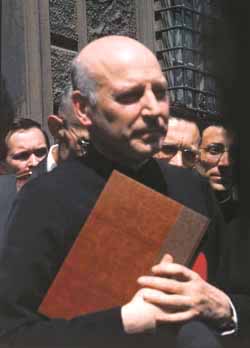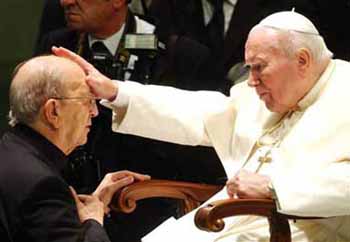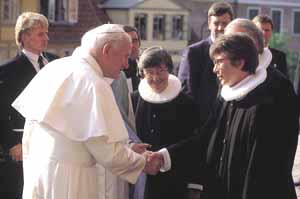
|
Fr. Georges de Nantes presented a complaint against John Paul II while he was still alive, a "complaint on account of heresy, schism, and scandal against our Brother in the faith Karol Wojtyla." The grounds for this complaint were collected in a Book of Accusation presented to the Holy See on 13 May 1983, and addressed to "our Holy Father John Paul II by the grace of God and the law of the Church sovereign judge of all Christ’s faithful." This action was in accordance with the Canons 212, 221, and 1417 of the Code of Canon Law, and yet the authorities always refused to examine or even to accept this accusation.
Obviously, if it were objectively false, unfounded, or indefensible, the “beatification” of John Paul II, announced for 1 May 2011, would indirectly put an end to the dispute.

Fr. de Nantes presents his Liber Accusationis against John Paul II in Rome, 1983
|
In the present catastrophic situation of the Church, facts and statistics daily confirm the predictions and analyses that Fr. de Nantes presented in Rome in 1983. They are the result that could be expected from the doctrinal errors for which he criticised John Paul II. Consequently, it is not possible to consider the aforesaid beatification other than as an abuse of power, a publicity grab, a colossal news item that will revive in a few week’s time "the atmosphere of John Paul II’s era": that of the immense celebrations, of huge popular crowds which, from jubilees to beatifications, punctuated the weekends of the eternal City during the twenty-five year pontificate" (La Croix, Monday, 17 January 2011), without any benefit for the Church or, consequently, for the salvation of souls.
"In the small chapel devoted to St. Sebastian, on the right-side aisle of St. Peter’s Basilica in Rome, in front of the central altar, workers are busy. Time is passing: everything must be ready to welcome in a few weeks the body of the Polish Pope…" Just as long ago the workers were busy on Red Square building Lenin’s mausoleum…
Our Lord warned us: False messiahs and false prophets will arise, and they will perform signs and wonders so great as to deceive, if that were possible, even the elect (Mt 24:24-25). That is why the Church has always considered the doctrinal examination of the writings of the “servant of God” as the first condition for the validity of his beatification. The recognition of a miracle is only taken into account to confirm the judgement on faith and the other virtues.
The examination of the teachings of John Paul II – if it took place – did not take Fr. de Nantes’ accusations into account. These accusations were taken up by us, Little Brothers and Little Sisters of the Sacred Heart, in a memorandum sent on 6 August 2005 to the postulator for the cause of John Paul II that has remained unanswered (He Is Risen, n° 37, September 2005, pp. 5-20).
If we are wrong, let them state so clearly!
Throughout the whole world people are vying with one another in celebrating "an extraordinary beatification for an exceptional Pope" (La Croix, 17 January). Outside the norms of the Catholic Faith, no one can be pleasing to God. How can a man who did not have the Catholic Faith be declared "blessed"?
For it is indeed the integrity of the Catholic Faith that is at stake. It is seriously undermined, and the peril of damnation for souls is great, terrifying even… for the judges as well as for the litigants in this process.

Fr. Maciel, blessed and protected by JPII, despite numerous serious allegations
|
How was a Pope who enjoys an apparently universal “reputation for holiness” able to leave the Church in an unprecedented state of "ruin"? The paedophilia scandal is its most visible sign, along with the crisis of the Institute of the Legionnaires of Christ, the founder of which, Fr. Marcial Maciel, benefited to the end from the friendship and confidence of the so called “blessed.”
The causes of this amazing blindness can be summed up in one simple proposition: John Paul II had faith in man. This resulted in a misdirection of Christian hope, in his mind and in the mind of the throngs that acclaimed him, in favour of the utopia of a new world here below, producing a tragic cooling of the virtue of charity in the Church.
A religious superior in Rome pointed out, with regard to Fr. Marcial Maciel: "Never have we seen a founder reach such heights of perversion. The charism of a congregation, however, always rests on the very person of its founder. How can we rebuild on such perverted foundations?" (La Croix, Monday, 4 January 2011).
These words can be applied to the whole Church, "a great city half in ruins," reduced to this state by the quarter-century reign of an innovating Pope whom Fr. de Nantes accused of betraying Christ and of having made Rome the seat of the Antichrist. Father never received the slightest denial of this from authority, nor a refutation of it from any theologian.
Cult of man
Whenever he could, John Paul II unceasingly proclaimed his "faith in man" to the extent of substituting him for Jesus Christ. For example, when he commented on Jesus’ reply to Pilate, You say I am a king. For this I was born and for this I came into the world, to bear witness to the truth. Whoever is of the truth hears My voice, John Paul II commented: "Christ is king in the sense that in Him, in the testimony that He rendered to the truth, is manifested the ‘kingship’ of every human being, the expression of every person’s transcendent character. Such is the Church’s proper inheritance" (N’ayez pas peur, Dialogue avec André Frossard, 1982, p. 225).
We say: This is the claim proper to the Antichrist. For this affirmation categorically contradicts the Catholic Faith, according to which the truth, to which Our Lord Jesus Christ bears witness, concerns God His Father and Himself, in His unique, sacred, inviolable and inaccessible Holiness, in other words, in His “transcendence” as Son of God, only King of the universe and Savior of all men.
John Paul II substitutes the human person, his transcendent dignity, his kingship, for the second Person of the Holy Trinity, the Son of God made man, the object of our Faith. It is a constant theme of Karol Wojtyla’s thought. He already stripped Our Lord Jesus Christ of His Kingship in the retreat preached before Paul VI in 1976: "The royal function of Jesus is not first of all to exercise authority over others; it is a manifestation of the kingly character of man. This kingly character is embedded within human nature, within the structure of the human personality" (Sign of Contradiction, p. 176)

In 1989, John Paul II greeting Lutheran women “bishops” in Denmark
|
To make every man a king in this way leads to underrating the relationship of love and grace that Christ wants to establish with each human person by calling him to enter the Catholic Church. According to John Paul II, Jesus no longer has to conquer souls one by one, each through his particular vocation, because "by His incarnation, the Son of God has united Himself in some fashion with every man." By continually quoting this proposition of the Second Vatican Council (Gaudium et spes, 22, 2), e.g. in the Encyclical Redemptor hominis, the Pope was quoting himself, because this affirmation was introduced into the conciliar schema by Karol Wojtyla, then Archbishop of Cracow.
It is in vain that one would seek the basis for such a doctrine in Holy Scripture or in the Fathers of the Church! The absence of any condition for the union of all with Christ leads to affirming it as given to all, without distinction of religion.
In Redemptor hominis, John Paul II indeed attempted to give a scriptural basis to this affirmation, which is the core of this encyclical, by recalling "St. John’s incisive expression in the prologue of his Gospel" according to which “the Word gave the power to become children of God.” To whom? To each man, by the sole fact of the Incarnation, the Pope repeats four times, at the cost of falsifying the inspired text!
In fact, the complete citation of St. John is as follows: To all who received Him, He gave the power to become children of God, to those who believe in His Name (Jn 1:12). That is to say, to those who believe in His inner Being, in His origin, in His mission, in Him who was born, not of blood nor of the will of the flesh nor of the will of man, but of God (Jn 1:12).
John Paul II confuses nature and grace, human life and divine life, the one being “in some fashion” present in the other, according to him, in everyone and forever, as he unequivocally affirms in paragraph 14 of the encyclical: "Christ is in some fashion united with each man without any exception whatever, even when he is unaware of it."
This naturalising of the supernatural dominated John Paul II’s entire pontificate. It led him to organise the universal interfaith meeting of prayer, fasting and a silent march for world peace on 27 October 1986, at Assisi.
Pope Benedict XVI is preparing to celebrate the 25th anniversary of this event by going himself next October, "as a pilgrim to the town of St Francis, inviting my Christian brethren of various denominations, the exponents of the world’s religious traditions (sic!) and, ideally, all men and women of good will, to join this Pilgrimage. It will aim to commemorate the historical gesture desired by my predecessor and solemnly to renew the commitment of believers of every religion to live their religious faith as a service to the cause of peace. Those journeying to God cannot but transmit peace, those who are building peace cannot but draw close to God." ("Angelus", Saturday, 1 January 2011)
These remarks only repeat those made by John Paul II, which Fr. de Nantes judged "quite false and insulting to the one, living and true God, Whom it is forbidden to mock in this way! It is insulting to His Christ, Jesus, the Jesus of history and of the Church, crucified by the Jews, rejected by the Muslims, despised by the Buddhists, ignored by the pagans! And it is insulting to Their Holy Spirit, Spirit of pure Truth and Charity, of fraternal love and forgiveness preserved in and by Christianity alone, whatever one-world dreamers may say.
"Yet millions of souls are also wronged and hurt – those multitudes whose faith and charity have secretly made them temples of the Holy Spirit and invisible members of Christ’s mystical Body, because all the lying praise of Talmudic, Islamic or Shintoist prayer, and of yoga or of Zen, or of the peace pipe of the great Manitou or the adored lingam (I speak Hindi out of respect for my lady readers), or the Serpent, the Sun and the Fire ... all the many lying compliments to the informed and conscious representatives of all the world’s false religions, work against the liberating preaching of the Gospel that would be the salvation of hundreds of millions of beings, and the blessed sanctification of thousands of them, already justified and eager for the splendours of the Eucharist, devotion to Our Lady and the saints, and all the treasures unknown to them of divine revelation, of the Church’s sacraments, of Christendom’s order and virtues.
"What a guilty and miserable man! What an accomplice of Satan is a Pope who speaks, in Mondo Vision, a language so false, truly deceptive and antichristic!" (CCR n° 197, February 1987, p. 10).

Posted March 8, 2011

The opinions expressed in this section - What People Are Commenting -
do not necessarily express those of TIA

Related Topics of Interest
 Another Open Letter on JPII Beatification Another Open Letter on JPII Beatification
 The Canonization of Wojtyla, the Moral-Free Pope The Canonization of Wojtyla, the Moral-Free Pope
 Saint Wojtyla? Saint Wojtyla?
 John Paul II "Blessed" by an Indian Shaman John Paul II "Blessed" by an Indian Shaman
 A Statue of Buddha over the Tabernacle in Assisi A Statue of Buddha over the Tabernacle in Assisi
 John Paul II Kisses the Koran at the Vatican John Paul II Kisses the Koran at the Vatican
 The Perplexing Pontificate of John Paul II The Perplexing Pontificate of John Paul II

|